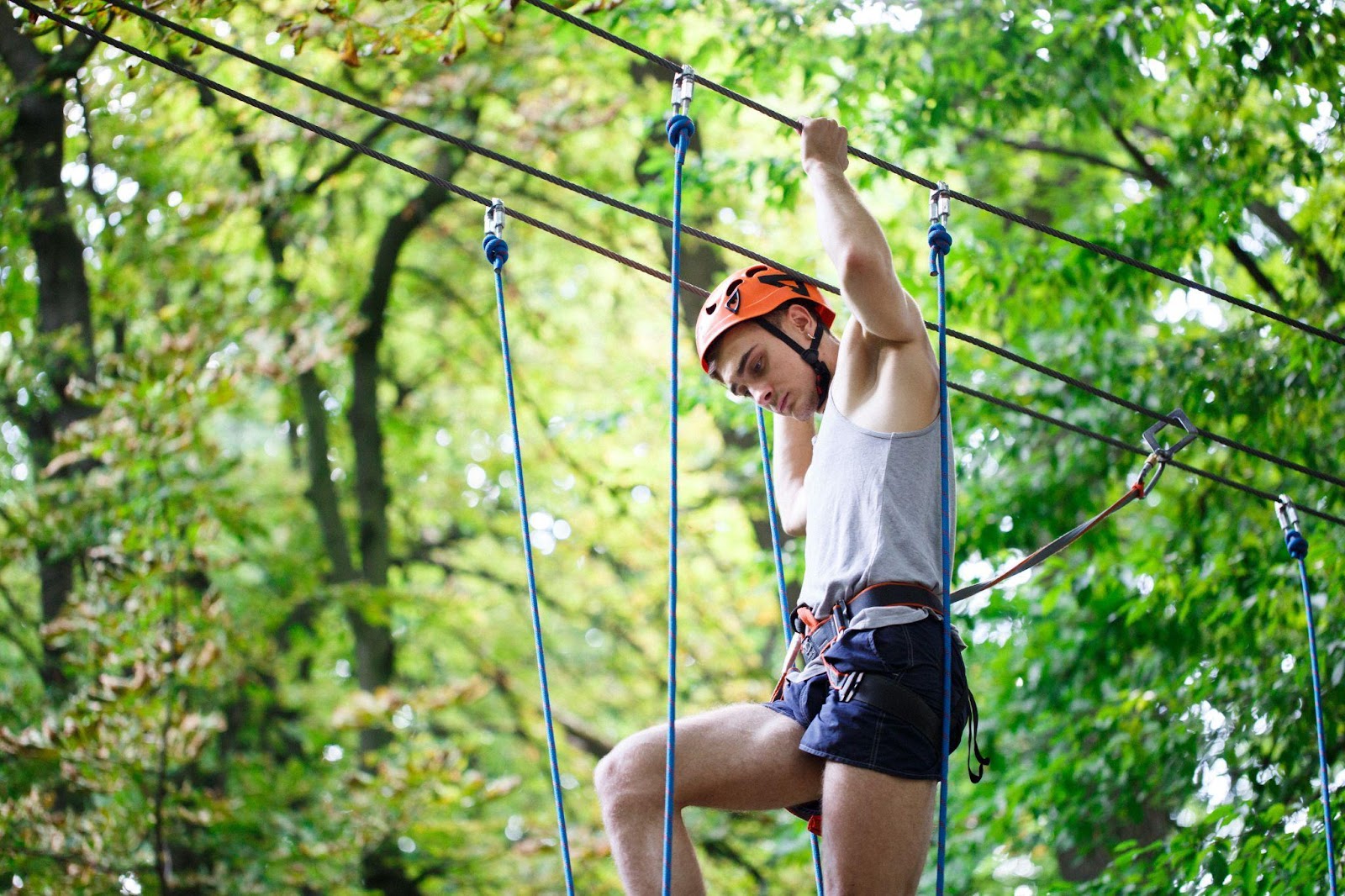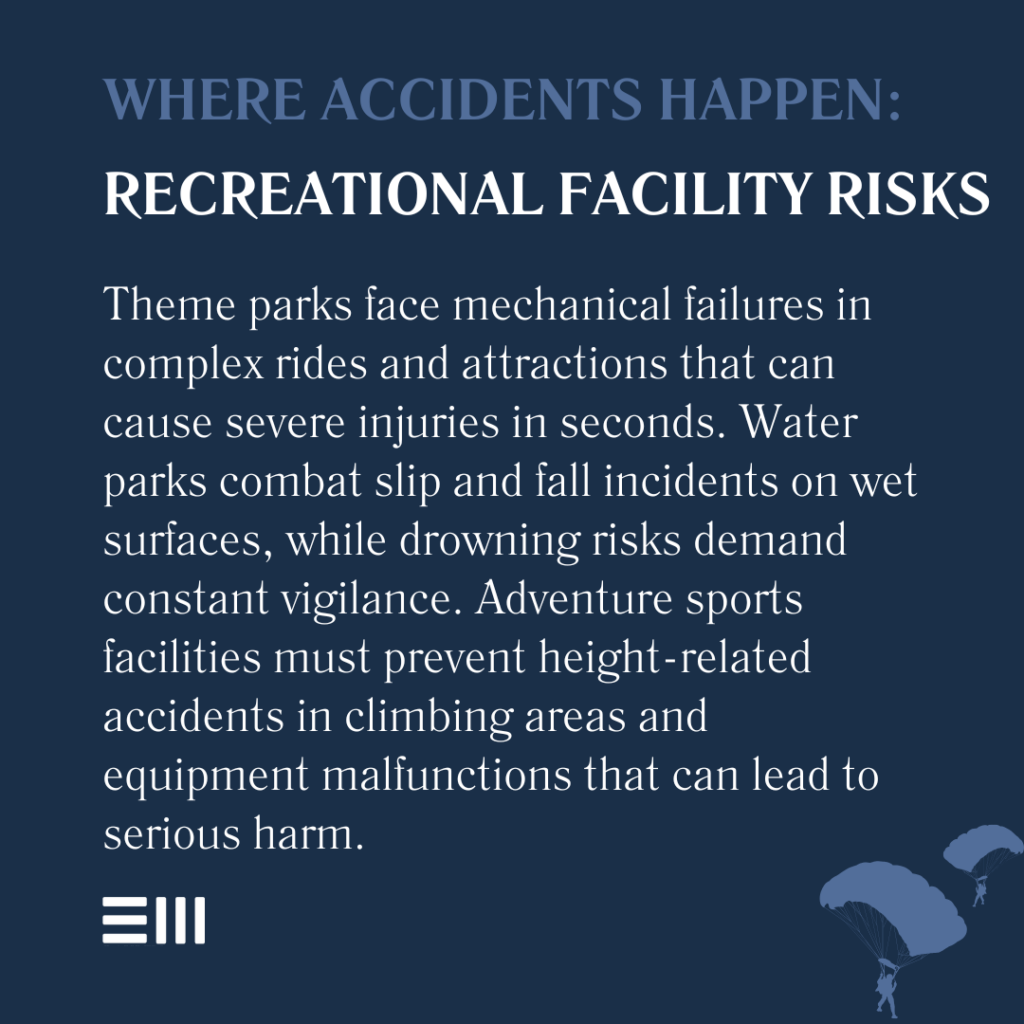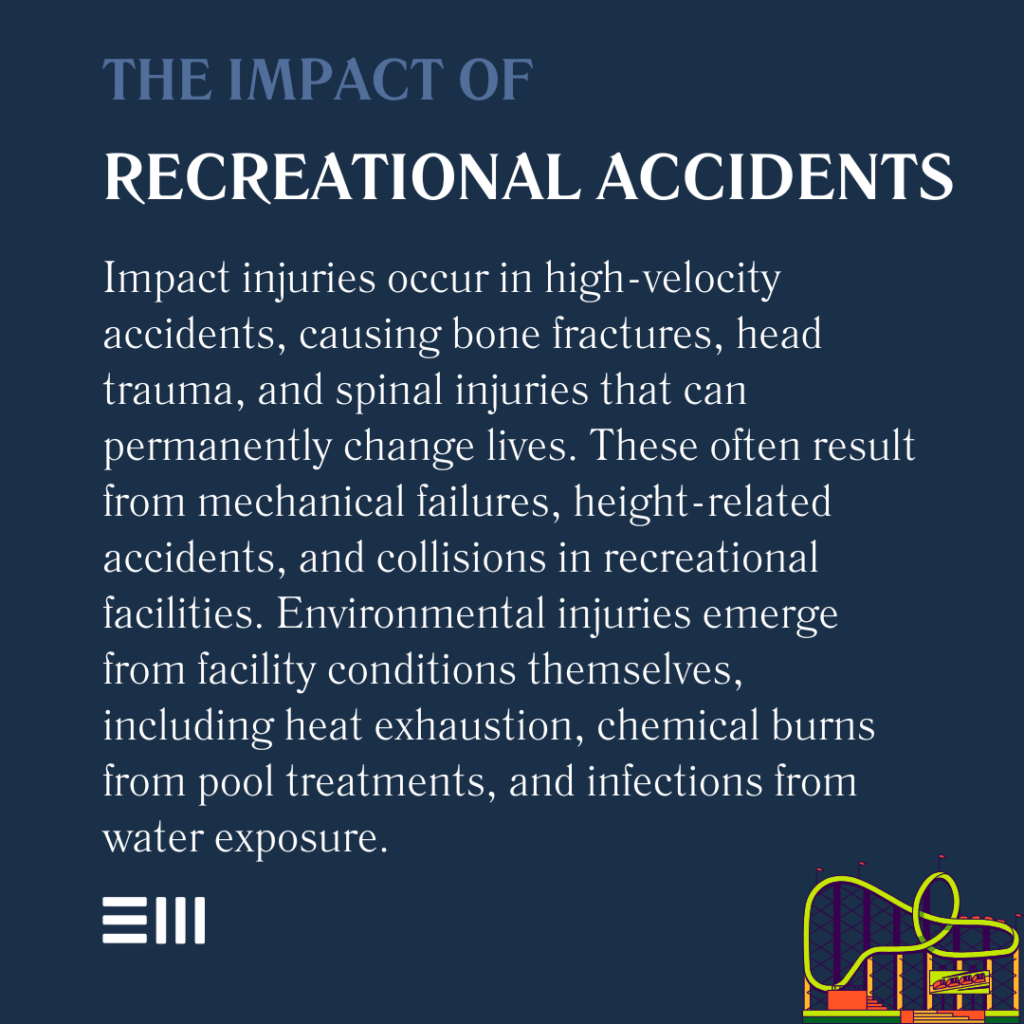
Behind the thrilling screams and excitement of Alabama’s recreational attractions lies a sobering reality.
Between 1987 and 2000, amusement park accidents resulted in an average of 4.5 deaths per year, though the numbers have slightly decreased in the years since.
One moment of negligence can transform a day of family fun into a life-altering event.
Understanding Recreational Accident Claims
The complex web of liability in recreational accidents often involves multiple parties, from facility operators to equipment manufacturers.
Each type of recreational venue presents unique risks and legal considerations that affect your right to compensation.
Types of Recreational Accidents
Theme parks, water parks, and adventure sports facilities face distinct safety challenges that can lead to serious injuries.
Understanding these differences helps establish liability and determine compensation.
- Mechanical failures in rides and attractions;
- Slip and fall incidents on wet surfaces;
- Height-related accidents in climbing facilities;
- Equipment malfunctions in adventure sports;
- Drowning incidents in water parks; and
- Collisions in go-kart attractions.
Each type of accident requires specific evidence and legal approaches to secure fair compensation.
Common Causes of Injuries
Most recreational accidents stem from preventable circumstances that facility operators must address:
- Inadequate staff training and supervision;
- Poor maintenance of equipment and facilities;
- Failure to enforce safety protocols;
- Improper signage or warnings;
- Overcrowding of facilities; and
- Defective safety equipment.
Understanding the root cause strengthens your claim and helps prevent future incidents.

Specific Facility Considerations
Different recreational venues present unique challenges and safety considerations. Understanding these specific risks helps establish liability and determine appropriate legal action.
Theme Park Safety Standards
Theme parks must maintain strict safety protocols:
- Daily ride inspections before opening;
- Regular maintenance schedules for all equipment;
- Height and weight restrictions enforcement;
- Weather monitoring systems;
- Emergency stop procedures;
- Operator certification and training;
- Queue line safety measures; and
- First aid station requirements.
These standards form the foundation for liability assessment in accident cases.
Water Park Responsibilities
Water parks face additional safety challenges:
- Water quality maintenance;
- Lifeguard staffing and training;
- Slide speed and capacity limits;
- Pool depth monitoring;
- Chemical balance testing;
- Surface texture maintenance;
- Drainage system upkeep; and
- Wave pool safety protocols.
Proper adherence to these requirements prevents many common accidents.
Adventure Sport Facility Requirements
Adventure sport venues must address unique risks:
- Equipment certification and inspection;
- Instructor qualifications;
- Safety briefing procedures;
- Emergency response plans;
- Weather condition monitoring;
- Participant skill assessment;
- Equipment fitting protocols; and
- Safety gear maintenance.
These requirements protect participants and establish liability standards.
Common Injuries and Medical Considerations
Understanding typical injuries helps victims prepare for legal action and medical recovery.
Impact Injuries
High-velocity accidents often result in:
- Bone fractures and breaks;
- Head trauma and concussions;
- Spinal cord injuries;
- Joint dislocations;
- Muscle and tendon damage; and
- Internal organ injuries.
Proper medical documentation of these injuries strengthens compensation claims.
Environmental Injuries
Facility conditions can cause various injuries:
- Heat exhaustion and dehydration;
- Chemical burns from pool treatments;
- Bacterial infections from water exposure;
- Allergic reactions to equipment;
- Respiratory issues from poor ventilation; and
- Environmental exposure problems.
These injuries often require extensive medical evidence to prove causation.

Legal Rights and Responsibilities
Recreational facilities must maintain strict safety standards while participants must follow posted guidelines. This balance affects liability determination and compensation options.
Facility Operator Duties
Operators of recreational facilities must fulfill specific obligations:
- Regular equipment inspection and maintenance;
- Proper staff training and certification;
- Clear safety instructions and warnings;
- Emergency response procedures;
- Weather monitoring and closure protocols; and
- Adequate security measures.
Failure to meet these obligations can establish negligence in accident cases.
Participant Responsibilities
Visitors to recreational facilities should:
- Follow all posted safety rules;
- Use provided safety equipment properly;
- Report suspicious conditions;
- Listen to staff instructions;
- Avoid restricted areas; and
- Maintain appropriate behavior.
Meeting these responsibilities strengthens your position in accident claims.
Frequently Asked Questions About Recreational Accidents in Alabama
Understanding your rights after a recreational accident in Alabama helps you make informed decisions about legal action.
Here are common questions from our clients.
What Should I Do Immediately After an Accident?
First steps after a recreational accident are crucial:
- Seek immediate medical attention;
- Report the incident to facility management;
- Document the scene with photos if possible;
- Collect witness contact information;
- Preserve any evidence including tickets and waivers; and
- Avoid signing any documents without legal review.
Taking these actions protects both your health and legal rights going forward.
How Does a Liability Waiver Affect My Case?
Liability waivers impact your case in several ways:
- May limit but not eliminate legal options;
- Cannot protect against gross negligence;
- Require careful legal review;
- May have enforcement limitations;
- Vary in scope and coverage; and
- Often contain important exceptions.
Professional legal analysis can identify opportunities despite signed waivers.
What Compensation Can I Recover?
Available compensation typically includes:
- Medical expenses and rehabilitation costs;
- Lost wages and earning capacity;
- Pain and suffering damages;
- Property damage replacement;
- Long-term care expenses; and
- Emotional distress compensation.
Each case receives individual evaluation based on specific circumstances.
How Long Do I Have to File a Claim?
Several factors affect your filing timeline:
- Alabama’s statute of limitations;
- Type of recreational facility;
- Age of the injured person;
- Severity of injuries;
- Discovery of harm; and
- Government facility involvement.
Early action provides the best opportunity for successful claims.
Steps to Protect Your Rights
The aftermath of a recreational accident requires careful attention to protect your legal interests and ensure fair compensation.
Documentation Requirements
Proper documentation strengthens your case:
- Medical records and bills;
- Incident reports and photos;
- Witness statements;
- Expert evaluations;
- Income loss verification; and
- Correspondence with facility.
Complete documentation supports maximum compensation recovery.
Legal Evaluation Process
Professional case evaluation includes:
- Review of accident circumstances;
- Analysis of liability issues;
- Assessment of damages;
- Identification of responsible parties;
- Determination of legal options; and
- Strategy development.
Thorough evaluation ensures appropriate legal approach.
Taking Action After Your Recreational Accident
Don’t let uncertainty about your legal rights prevent you from seeking the compensation you deserve. Our experienced legal team understands the complexities of recreational accident cases and can help protect your interests.
Contact our office today for a free, confidential consultation about your recreational accident case. Our attorneys will evaluate your situation, explain your options, and guide you through the legal process.
Can't find what you're looking for? Search our site below.










